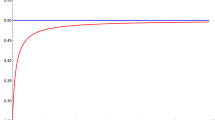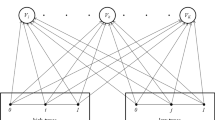Abstract
We report the results of laboratory experiments on rent-seeking contests with endogenous participation. Theory predicts that (a) contest entry and rent-seeking expenditures increase with the size of the prize and (b) earnings are equalized between the contest and the outside option. While the directional predictions offered in (a) are supported in the data, the level predictions are not. Prediction (b) is not supported in the data: when the prize is large, contest participants earn more than the outside option. When the prize is small, contest participants earn less. Previous studies of gender and contest competition suggest that females should (a) not perform as well in the contest; and (b) enter at a lower rate. We find some support for (a) but not for (b). Women participate in the contest at the same rate as men.
Article PDF
Similar content being viewed by others
Avoid common mistakes on your manuscript.
References
Abbink K., Brandts J., Herrmann B., Orzen H.: Inter-group conflict and intra-group punishment in an experimental contest game. Am Econ Rev 100, 420–447 (2010)
Anderson L.R., Stafford S.L.: An experimental analysis of rent-seeking under varying competitive conditions. Public Choice 115, 199–216 (2003)
Braga J., Humphrey S., Starmer C.: Market experience eliminates some anomalies—and creates new ones. Eur Econ Rev 53, 401–416 (2009)
Camerer C.: Behavioral game theory: experiments in strategic interaction. Princeton University Press, Princeton (2003)
Casari M., Ham J.C., Kagel J.H.: Selection bias, demographic effects, and ability effects in common value auction experiments. Am Econ Rev 97, 1278–1304 (2007)
Cason, T.N., Masters, W.A., Sheremeta, R.M.: Entry into winner-take-all and proportional-prize contests: an experimental study. J Public Econ (2010, forthcoming)
Charness G., Levin D.: The origin of the winner’s curse: a laboratory study. Am Econ J Microecon 1, 207–236 (2009)
Chen, Y., Katuscak, P., Ozdenoren, E.: Why can’t a woman bid more like a man? University of Michigan Working Paper (2005)
Corcoran W.: Long-run equilibrium and total expenditures on rent-seeking. Public Choice 43, 89–94 (1984)
Corcoran W., Karels G.: Rent-seeking behavior in the long-run. Public Choice 46, 227–246 (1985)
Cornes, R., Hartley, R.: Risk aversion in symmetric and asymmetric contests. Econ Theory (2010). doi:10.1007/s00199-009-0490-9
Cox J., Grether D.: The preference reversal phenomenon: response mode, markets and incentives. Econ Theory 7, 381–405 (1996)
Davis D.D., Reilly R.J.: Do too many cooks always spoil the stew? An experimental analysis of rent-seeking and the role of a strategic buyer. Public Choice 95, 89–115 (1998)
Dohmen, T., Falk, A., Huffman, D., Sunde, U., Schupp, J., Wagner, G.: Individual risk attitudes: new evidence from a large, representative, experimentally-validated survey. IZA Discussion Paper 1730 (2005)
Fonseca M.A.: An experimental investigation of asymmetric contests. Int J Ind Organ 27, 582–591 (2009)
Fullerton R.L., McAfee R.P.: Auctioning entry into tournaments. J Polit Econ 107, 573–605 (1999)
Gneezy U., Niederle M., Rustichini A.: Performance in competitive environments: gender differences. Q J Econ 118, 1049–1074 (2003)
Ham J., Kagel J.: Gender effects in private value auctions. Econ Lett 92, 375–382 (2006)
Hehenkamp B., Leininger W., Possajennikov A.: Evolutionary equilibrium in tullock contests: spite and overdissipation. Eur J Polit Econ 20, 1045–1057 (2004)
Herrmann, B., Orzen, H.: The appearance of homo rivalis: social preferences and the nature of rent-seeking. CeDEx Discussion Paper 2008-10, University of Nottingham (2008)
Kahneman D.: Experimental economics: a psychological perspective. In: Tietz, R., Albers, W., Selten, R. (eds) Bounded Rational Behavior in Experimental Games and Markets, Springer, Berlin (1988)
Kong, X.: Loss aversion and rent-seeking: an experimental study. CeDEx Discussion Paper 2008-13, University of Nottingham (2008)
Konrad, K.A.: Strategy in contests: an introduction. WZB-Markets and Politics Working Paper No. SP II 2007-01 (2007)
Konrad K.A., Schlesinger H.: Risk aversion in rent-seeking and rent augmenting games. Econ J 107, 1671–1683 (1997)
Mathews T., Namoro S.: Participation incentives in rank-order tournaments with endogenous entry. J Econ 95, 1–23 (2008)
Millner E.L., Pratt M.D.: An experimental investigation of efficient rent-seeking. Public Choice 62, 139–151 (1989)
Millner E.L., Pratt M.D.: Risk aversion and rent-seeking: an extension and some experimental evidence. Public Choice 69, 81–92 (1991)
Morgan, J., Steiglitz, K., Reis, G.: The spite motive and equilibrium behavior in auctions. Contributions to Economic Analysis and Policy 2:1, Article 5 (2003)
Morgan J., Orzen H., Sefton M.: Network architecture and traffic flows. Games Econ Behav 66, 348–372 (2009)
Morgan, J., Orzen, H., Sefton, M.: Does entry eliminate economic profit? An experimental study. University of California, Berkeley Working Paper (2010)
Niederle M., Vesterlund L.: Do women shy away from competition? Do men compete too much?. Q J Econ 122, 1067–1101 (2007)
Nitzan S.: Modeling rent seeking contests. Eur J Polit Econ 10, 41–60 (1994)
Potters J., de Vries C., van Winden F.: An experimental examination of rational rent-seeking. Eur J Polit Econ 14, 783–800 (1998)
Schmidt, D., Shupp, R., Walker, J.: Resource allocation contests: experimental evidence. CAEPR Working Paper, No. 2006-004 (2006)
Schmitt P., Shupp R., Swope K., Cadigan J.: Multi-period rent-seeking contests with carryover: theory and experimental evidence. Econ Governance 5, 187–211 (2004)
Sheremeta R.M.: Experimental comparison of multi-stage and one-stage contests. Games Econ Behav 68, 731–747 (2010)
Sheremeta, R.M.: Contest design: an experimental investigation. Econ Inquiry (2010). doi:10.1111/j.1465-7295.2009.00274.x
Shogren J.F., Baik K.H.: Reexamining efficient rent-seeking in laboratory markets. Public Choice 69, 69–79 (1991)
Shupp, R.: Single versus multiple winner rent-seeking contests: an experimental investigation. Ball State University Working Paper (2004)
Skaperdas S.: Contest success functions. Econ Theory 7, 283–290 (1996)
Tullock G.: The welfare costs of tariffs, monopoly and theft. Western Econ J 5, 224–232 (1967)
Tullock G.: Efficient rent-seeking. In: Buchanan, J.M., Tollison, R.D., Tullock, G. (eds) Toward a Theory of Rent-Seeking Society, pp. 97–112. Texas A&M University Press, College Station (1980)
Open Access
This article is distributed under the terms of the Creative Commons Attribution Noncommercial License which permits any noncommercial use, distribution, and reproduction in any medium, provided the original author(s) and source are credited.
Author information
Authors and Affiliations
Corresponding author
Additional information
We thank Tim Cason, Roman Sheremeta, Dan Kovenock, two anonymous referees and participants at the Centre for Economic Studies/Information und Forschung (CESifo) Venice Summer Institute for very useful comments. Morgan gratefully acknowledges the financial support of the National Science Foundation.
Rights and permissions
Open Access This is an open access article distributed under the terms of the Creative Commons Attribution Noncommercial License (https://creativecommons.org/licenses/by-nc/2.0), which permits any noncommercial use, distribution, and reproduction in any medium, provided the original author(s) and source are credited.
About this article
Cite this article
Morgan, J., Orzen, H. & Sefton, M. Endogenous entry in contests. Econ Theory 51, 435–463 (2012). https://doi.org/10.1007/s00199-010-0544-z
Received:
Accepted:
Published:
Issue Date:
DOI: https://doi.org/10.1007/s00199-010-0544-z




